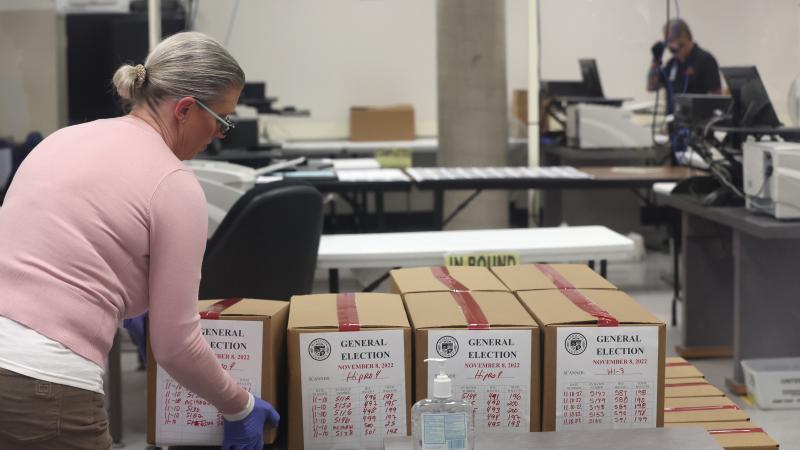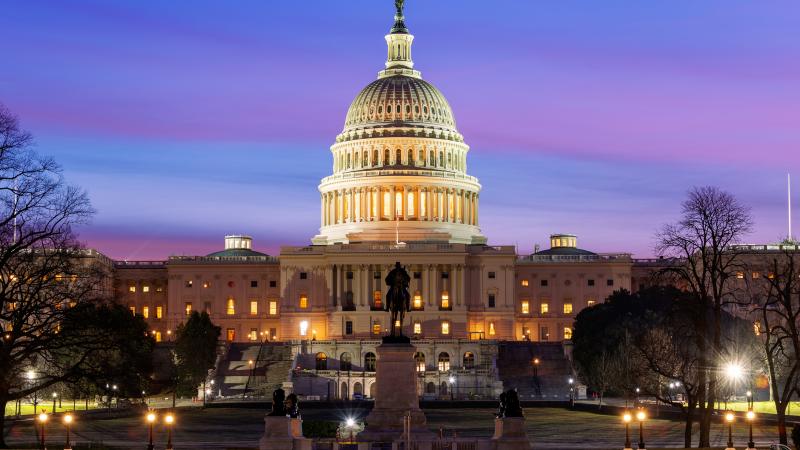NIH asks court to mask official who deleted Chinese COVID data, 19 months after outing him
Agency "curator" and Chinese researcher who requested deletions were identified by name in December 2020 FOIA production, before Congress started asking questions about the Sequence Read Archive.
Republican senators blasted the National Institutes of Health for asking a court to retroactively seal the names of a Chinese researcher and an agency staffer involved in the deletion of data from its genetic sequencing library, calling the effort an ongoing "cover-up" that "further underscores the agency's shady efforts to conceal pertinent data" on the origins of COVID-19.
NIH disclosed the pair's names and actions 19 months ago to fulfill a public records request, also identifying multiple staffers who manage its Sequence Read Archive (SRA) and Chinese researchers who submitted sequences early in the pandemic.
But the two names associated with the March 2020 SRA deletion came up again, unredacted, in different records the agency turned over this year in response to a Freedom of Information Act lawsuit, prompting NIH to tell the court it goofed and wanted their names redacted.
The revelation raises questions about the legal basis for shielding the identities of foreign researchers who requested deletions of their uploaded sequences and agency staff who approved them, as public transparency groups continue their quest for NIH records that could shed light on the origins of the pandemic and its early handling.
"NIH's cover-ups align them with the Chinese Communist Party whitewashes," Sen. Roger Marshall (R-Miss.) told Just the News. The agency has "obstructed investigative efforts at every level" while inconsistently following FOIA requirements, "so I am not surprised that they released a name and are now trying to cover their tracks."
“Time and again, the NIH has been dishonest about COVID's origins and gain-of-function research at a Wuhan lab," Sen. Marsha Blackburn (R-Tenn.) told Just the News. "The American people deserve full transparency on information that could reveal how the pandemic began and who was involved — not more antics from an agency that takes zero accountability for its actions."
NIH is seeking the dismissal of the FOIA lawsuit by whistleblower support group Empower Oversight, founded by former Senate Judiciary Committee investigator Jason Foster.
While the agency claimed it "conducted searches reasonably calculated to lead to responsive records" and that redactions were lawful "because of the amount of misinformation surrounding the COVID-19 pandemic and its origins," it treated two batches of produced emails differently.
Empower told the court the agency can't hide the identities of the NIH "curator" and Wuhan University researcher from a June 2020 deletion, given its disclosure in May 2022 of curator Rick Lapoint and South China Agricultural University researcher Kangpeng Xiao from a March 2020 deletion.
NIH responded by filing a motion to seal portions of documents identifying Lapoint and Xiao to prevent their "harassment and media scrutiny."
If that disclosure was an accident, as NIH claimed to the court July 15, it wasn't the first time the agency had disclosed their identities. Lapoint and Xiao show up unredacted among other NIH curators and Chinese researchers in a December 2020 production to U.S. Right to Know, a public health investigative research group.
Those documents show Xiao asked Lapoint March 10, 2020 to delete two "unrelated" sequences he uploaded to the SRA, and the curator responded hours later that they had been "withdrawn." Lapoint assured the researcher those sequences and "associated SRA data will not be available for download when the rest of the submission is released."
The requesters and approvers of SRA removals are visible to researchers. Viral evolution researcher Jesse Bloom asked NIH in October 2021 about the removal and unexplained reappearance of the sequences on the SRA more than a year later, naming Lapoint and Xiao. NIH didn't redact their names in the production to Empower.
Former Senate Finance Committee investigator Paul Thacker highlighted the earlier disclosure in his newsletter Tuesday, calling it indicative of "NIH's aggressive, haphazard approach to redacting documents and hiding information that might explain how the pandemic started."
The revisions to SRA datasets "involved key studies that virologists were using at the time to promote the now discredited theory that the COVID-19 virus may have passed from pangolins to humans," Thacker wrote. U.S. Right to Know published Xiao's several months of deletions and revisions of SRA data in December 2020.
Empower's Foster speculated NIH belatedly became alarmed at the names being public, not realizing in 2020 their "potential significance and relevance to a controversy that would later generate questions" from Sens. Chuck Grassley (R-Iowa), Blackburn and Marshall.
The legislative trio asked then-NIH Director Francis Collins in June 2021 to explain "how and under what circumstances data can be provided" to and deleted from the SRA and who had authority to remove data, among other questions about the SRA and Chinese-requested deletions.
Foster told Just the News "I should have" noticed NIH had disclosed the names before they showed up in the second batch of FOIA emails to Empower, because Bloom included a partially redacted screenshot of the Lapoint-Xiao email in his preprint study on NIH deletions to the database. Bloom shared that study with Collins and National Institute of Allergy and Infectious Diseases Director Anthony Fauci before publishing it.
Empower filed its opposition to NIH's motion to seal Friday, noting "NIH has not asked the Court to 'claw back' the records purportedly lacking the agency's intended redactions that it claims to have mistakenly failed to make."
The personal-privacy exemption in FOIA is expressly limited to "significant" privacy interests, not simply being named in a government email, and NIH is trying to overturn the "status quo" by asking the court to fix the purported mistake by its FOIA officer, the opposition says.
The agency's stated fear of "heightened public scrutiny with anything remotely related to COVID-19" is not grounds under FOIA to belatedly redact the public record, according to Empower.
NIH's concerns about harassment and media scrutiny are related to "the merits of the agency’s reliance" on the personal-privacy exemption, the filing says. Noting that the names showed up in the public record because Bloom asked NIH about them and that Xiao wrote a paper comparing COVID to pangolin coronaviruses, Empower observes: "NIH now asks this Court to seal the name of a researcher publicly listed as an author of that article."
The agency didn't respond to Just the News requests to justify sealing records to protect names that NIH made public 19 months ago and respond to the senators' criticisms.
The Facts Inside Our Reporter's Notebook
Documents
Videos
Links
- NIH is seeking the dismissal
- NIH responded by filing a motion to seal portions of documents
- December 2020 production to U.S. Right to Know
- Paul Thacker highlighted the earlier disclosure
- Xiao's several months of deletions and revisions of SRA data
- NIH was belatedly alarmed at the names being public
- The legislative trio asked then-NIH Director Francis Collins
- preprint study on NIH deletions
- Bloom shared that study
















